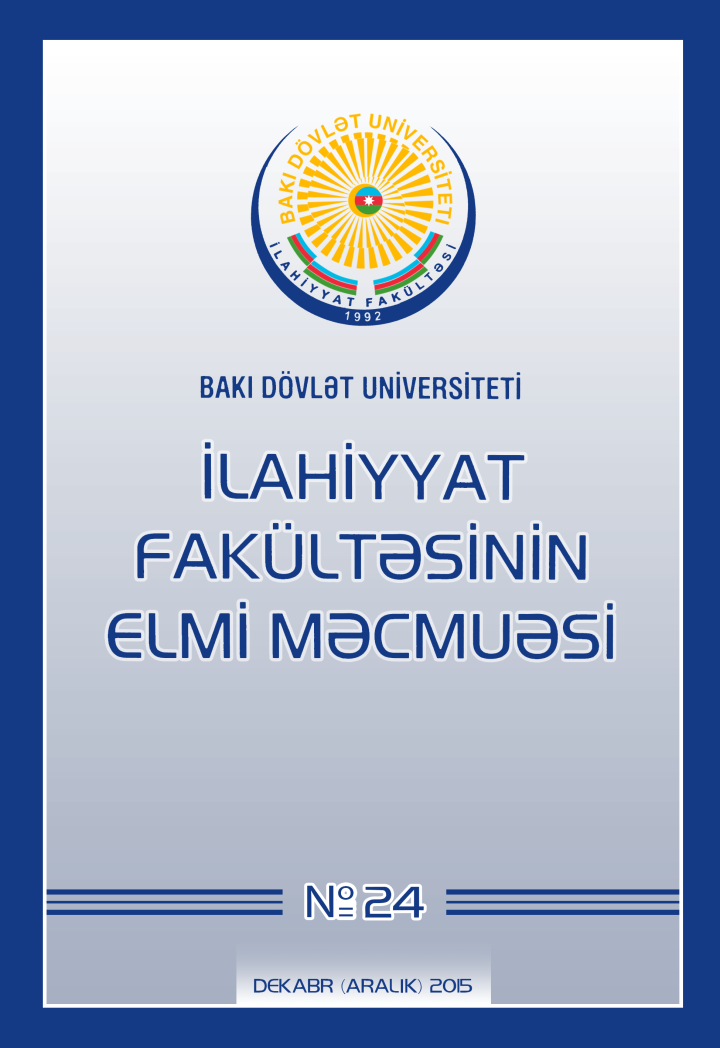Spinozanın fəlsəfəsində intuitiv idrak (scientia intuitiva) problemi
The Problem of Intuitive Knowledge (Scientia Intuitiva) in the Philosophy of Spinoza
Заур Рашидов Проблема интуитивного познания (scientia intuitiva) в философии Спинозы
Bartuschat Wolfgang. “The Infinite Intellect and Human Knowledge”. In Spinoza on Knowledge and the Human Mind. Edited by: Y. Yovel. Leiden: “Brill”, 1994, pp. 187– 208.
Blair. R. G. “Spinoza's Account of Imagination”. In Spinoza A collection of critical essays. Edited by: Marjorie Glicksman Grene. New York: “Anchor Books”, 1973, pp. 318 – 328.
Broad Charlie Dunbar. Five Types of Ethical Theory. London: “Routledge & K. Paul”, 1967.
Dijn Herman de. Spinoza: The Way to Wisdom. West Lafayette: “Purdue University Press”, 1996.
Ellsiepen Christof. “The Types of Knowledge (2p38-47)”. In Spinoza's Ethics: A Collective Commentary. Edited by: Michael Hampe, Ursula Renz and Robert Schnepf. Leiden: “Brill”, 2011, pp. 129 – 145.
Floistad Guttorm. “Spinoza's Theory of Knowledge and the Part–Whole Structure of Nature”. In Spinoza on Knowledge and the Human Mind. Edited by: Y. Yovel. Leiden: “Brill”, 1994, pp. 37– 47.
Forsyth T. M. “Spinoza's Doctrine of God in Relation to His Conception of Causality”. In Spinoza in Spinoza, critical and interpretive essays. Edited by: S. P. Kashap. California: “University of California Press”, 1972, pp. 3 –15.
Garrett Aaron. Meaning in Spinoza’s Method. Cambridge, UK: “Cambridge University Press “, 2003.
Gilead Amihud. “The Indispensability of the First Kind Knowledge”. In Spinoza on Knowledge and the Human Mind. Edited by: Y. Yovel. Leiden: “Brill”, 1994, pp. 209– 221.
Hallett. H. Foster. Benedict de Spinoza. The elements of his philosophy. London: “Athlone Press”, 1957.
Harris Errol. Salvation from Despair. A Reappraisal of Spinoza’s Philosophy. The Hague: “Martinus Nijhoff Publishers”, 1973.
Harris Errol. The Substance of Spinoza. New Jersey: “Humanities Press”, 1995.
Lermond Lucia. The Form of Man: Human Essence in Spinoza's Ethic. Leiden: “E.J. Brill”, 1988.
Lloyd Genevieve. Spinoza and the Ethics. New York: “Routledge”, 1996.
Shirley Samuel. Spinoza: Complete Works. Indianapolis: “Hackett Publishing Company Inc”, 2002.
Smith Steven B. Spinoza’s Book of Life: Freedom and Redemption in the Ethics. New Haven, CT: “Yale University Press”, 2003.
Yovel Yirmiyahu. “The Third Kind of Knowledge as Alternative Salvation”. In Spinoza: Issues and Directions. Edited by: Edwin Curley and Pierre-François Moreau. Leiden: “E.J. Brill”, 1990, pp. 157 – 175.
Downloads
Article Information
- Article Type Articles
- Submitted December 31, 2015
- Published December 31, 2015
- Issue № 24(24) December 2015
- Section Articles
